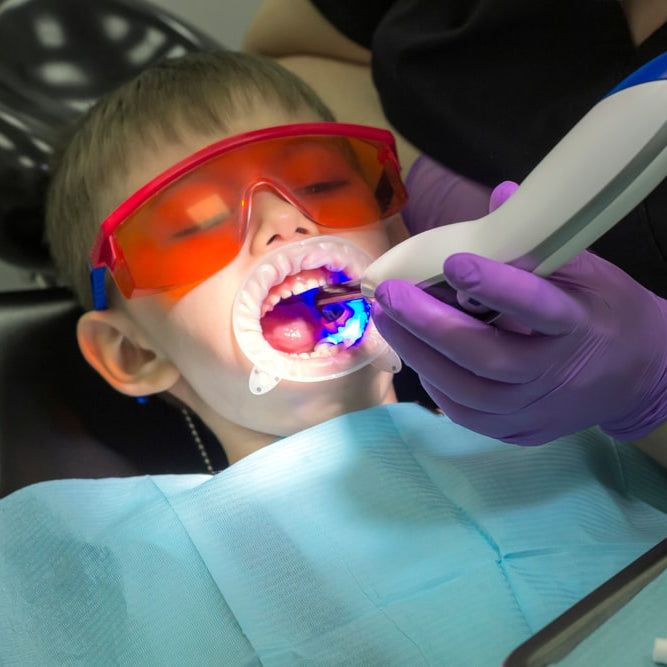
Appointment
Apppointment

As you probably know, humans grow a first set of baby teeth before their adult teeth grow in. Baby teeth begin to grow in between 4 and 15 months during the first year of life. Every child is different, so don’t worry if your baby doesn’t hit every milestone right on time.
Below, you’ll find answers to all your questions about your baby’s first teeth!
Babies’ teeth begin to erupt around 6 months. That’s just an average: a baby’s first tooth may erupt anywhere from 4 months to 13 months. If a baby doesn’t have any teeth showing by 18 months, it’s good to visit a pediatric dentist and have their teeth examined. Children born prematurely may have delayed teeth growth.
Generally, the first teeth to erupt are the bottom front teeth, followed by the top front teeth. Side teeth are usually next, and afterwards the molars and canines. Most children will have all their teeth by 3 years old.
Teething is the natural process of babies growing their teeth, from the pain and discomfort that occurs before a tooth erupts, to the actual pushing through of the tooth through the gum-line. This begins around 4-6 months of age. You will likely notice that your baby begins to chew on their hands or toys as a way to alleviate pressure on their gums.
Your child may experience painful teething throughout the growth process, from 6-15 months to around 3 years old. Unfortunately, the last teeth tend to hurt the most, since they are the back molars and thus the biggest teeth. Because children are older and more developmental advanced at this point, however, they are better able to tell you that their teeth are hurting them and can ask for help.
Yes, there is pain and discomfort associated with the process of tooth eruption. The teeth buds push against the gums, which puts pressure on them, until the gum line thins, and the tooth finally erupts into the mouth. Most parents can agree that teething is a difficult time for babies and their sleep-deprived caregivers, but there are many tips and tricks that can help alleviate your child’s discomfort while their teeth grow in.
There are many methods for teething pain: you can try a frozen washcloth or special teething toy. You can wash and freeze many plastic or rubberized toys for a cool, soothing chew toy. Gently massaging the sore spot where the tooth is growing can help, as can infant Tylenol. The FDA warns against the use of teething necklaces or bracelets, which can cause strangulation or choking hazards.
While first-tooth eruption can begin anywhere between 4-15 months, babies whose teeth have still not erupted by 18 months should consult a dentist. Delayed teething can cause irregular growth of the baby teeth, as well as complications such as cysts, cavities, or hyperdontia. All babies should see a dentist in the first year of life, whether or not they have begun teething.
Yes, you should start brushing your baby’s teeth, even when they only have 1 or 2. Brush after meals and especially before bedtime. Use a finger brush or a soft baby toothbrush, as well as very small amount of fluoridated toothpaste the size of a grain of rice. . Don’t worry about trying to make them spit – the tiny amount of toothpaste will help protect their teeth enamel without any harm from swallowing. You can graduate to a pea-sized amount for children 3 years and older, and begin to introduce spitting in the sink as part of the tooth-brushing process
The American Dental Association recommends that all children see a dentist within their first year of life. While these early visits are more to monitor progress than to do the kind of cleaning and x-rays your child will receive later in life, your child’s dentist will gently examine their mouth and teeth to ensure healthy growth of the baby teeth, and talk to you and other caregivers about how to keep your child’s teeth healthy and happy, for a lifetime of smile joy.